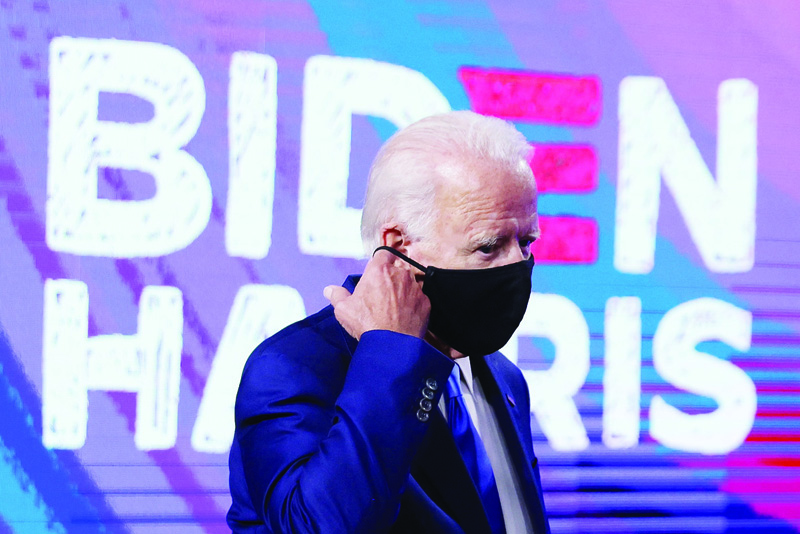
WASHINGTON: The US has urged states to get ready for a potential Covid-19 vaccine rollout two days before the presidential election, it emerged Wednesday, as France prepared to present a mammoth spending plan for its virus-hit economy. Across the world, governments are hoping to announce a vaccine as soon as possible to reopen economies shuttered to contain an illness that has killed more than 850,000 people and infected over 25 million.
In a widely circulated letter, the US Centers for Disease Control and Prevention asked states to sweep away red tape that could prevent a network of vaccine distribution centers being "fully operational by Nov 1, 2020." That is two days before voters head to the polls in an election clouded by the virus and the economic crisis it provoked, sparking concerns President Donald Trump's administration is rushing to have a vaccine before November 3.
"The normal time required to obtain… permits presents a significant barrier to the success of this urgent public health program," CDC head Robert Redfield told states in the August 27 letter. "CDC urgently requests your assistance in expediting applications for these distribution facilities." Priority will be given to essential workers, national security officials, seniors and members of vulnerable racial and ethnic groups, according to The New York Times.
Three Western drug makers are progressing with their Phase 3 clinical trials, involving tens of thousands of participants. AstraZeneca is partnering with Oxford University in England while Moderna is collaborating with the US National Institutes of Health. Pfizer and BioNTech are partnering on the third candidate.
'Dangerous'
Under normal procedures, test administrators must wait - probably for months - to verify that vaccine candidates work and are safe. The US Food and Drug Administration however has raised the possibility that a vaccine might be given emergency authorization before the end of trials. The FDA has faced mounting criticism from the medical community that it is bowing to political pressure from Trump, who is behind Democratic challenger Joe Biden in the polls and has said one might be ready before the election.
"This means mass vaccination nationwide could start in 59 days. FIFTY-NINE DAYS. Is any #COVID19 #vaccine likely to have completed Phase 3 safety and efficacy clinical trials, and gone through full scientific and @US_FDA review in 59 days?" award-winning epidemiology writer Laurie Garrett asked on Twitter.
"To my knowledge, none of the US #COVID19 #vaccines have finished even enrolling test subjects for Phase 3 trials. Rushing this to completion within 59 days is DANGEROUS." FDA chief Stephen Hahn, however, has denied he is acting under pressure from Trump, arguing that any vaccine approval would be a "science, medicine, data decision." The US has registered more than six million Covid-19 cases - almost a quarter of the global total - and 185,000 deaths.
Shutdowns have taken a toll on livelihoods across the globe as business revenues plunge and millions are forced out of work. In Europe, where GDP plunged 12.1 percent in the three months to June, fears are growing of more lockdowns and disruption this autumn and winter as the virus resurges. The French economy has been pushed into its worst downward spiral since 1945, with GDP down 13.8 percent in the second quarter, after a drop of more than five percent in the first.
Venice festival tribute
Paris, hoping to ward off the threat of mass layoffs, has earmarked 100 billion euros ($120 billion) to counter the devastating impact of the coronavirus. Some critics say the money may come too late to save many companies, while others say high hopes for President Emmanuel Macron's green revolution in the French economy are likely to be dashed.
Economists have welcomed the departure from the kind of austerity measures seen after the 2008 crisis which were "a huge error," said Philippe Martin, who heads up the CAE think tank, which advises the government. Unlike the post-2008 crisis response, much of the new plan targets the supply and investment side of the economy, namely businesses. The measures over the next two years include 10 billion euros' worth of corporate tax cuts.
Biden campaign
Democratic presidential candidate Joe Biden raised more than $364 million in August, reportedly breaking the record for monthly campaign donations even though his fundraising efforts were largely online because of the coronavirus pandemic. The former vice president and the Democratic National Committee pulled in a total of $364.5 million, of which $205 million were pledged online from small donors, his campaign team said Wednesday. The previous record was set by Barack Obama and the DNC in September 2008, when he raised almost $200 million, according to CBS and New York Times reports. "That figure blows me away," said the 77-year-old Biden in a statement thanking his supporters.
"Over $205 million, or 57 percent of the money we raised, came from online donations, from people like you, chipping in $5, $10, $20 at a time," the candidate added. Having prepared his re-election campaign since he arrived in the White House in early 2017, 74-year-old President Donald Trump still has a larger overall war chest, but Biden has been drawing in ever larger sums since winning the Democratic primary in April. "We have to keep breaking records if we want to ensure a fighting chance at winning this thing," Biden urged his supporters.
"Trump's money machine remains and it's bolstered by outside, dark money-not grassroots donors like all of you," Biden said. "And you better believe they will pour it all into attacks and smears against me, against Kamala, and against our campaign." Biden's pick of California Senator Kamala Harris as his running mate, making her the woman of color on a major party presidential ticket, fired up his donor base, raising $26 million in 24 hours, Biden revealed on August 12. In July, Trump and the Republic National Committee raised $165 million, against $140 million for the Democrats the same month. - Agencies









